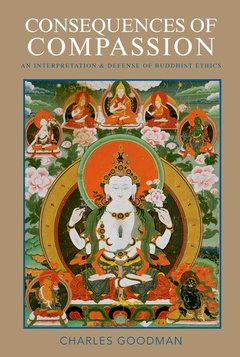Description
Consequences of Compassion
An Interpretation and Defense of Buddhist Ethics
Author: Goodman Charles
Language: English
Consequences of Compassion
Publication date: 09-2014
Support: Print on demand
Publication date: 09-2014
Support: Print on demand
Consequences of compassion: an interpretation and defense of buddhist ethics (harback)
Publication date: 07-2009
264 p. · 16.3x24 cm · Hardback
Publication date: 07-2009
264 p. · 16.3x24 cm · Hardback
Description
/li>Contents
/li>Biography
/li>
To many Westerners, the most appealing teachings of the Buddhist tradition pertain to ethics. Many readers have drawn inspiration from Buddhism's emphasis on compassion, nonviolence, and tolerance, its concern for animals, and its models of virtue and self-cultivation. There has been, however, controversy and confusion about which Western ethical theories resemble Buddhist views and in what respects. In this book, Charles Goodman illuminates the relations between Buddhist concepts and Western ethical theories. Every version of Buddhist ethics, says Goodman, takes the welfare of sentient beings to be the only source of moral obligations. Buddhist ethics can thus be said to be based on compassion in the sense of a motivation to pursue the welfare of others. On this interpretation, the fundamental basis of the various forms of Buddhist ethics is the same as that of the welfarist members of the family of ethical theories that analytic philosophers call 'consequentialism.' Goodman uses this hypothesis to illuminate a variety of questions. He examines the three types of compassion practiced in Buddhism and argues for their implications for important issues in applied ethics, especially the justification of punishment and the question of equality.
Introduction. 1.. Fundamental Buddhist Teachings. 2.. Main Features of some Western Ethical Theories. 3.. Theravada Ethics as Rule-Consequentialism. 4.. Mahayana Ethics Before Santideva. 5.. Santideva and After. 6.. Transcending Ethics. 7.. Buddhist Ethics and the Demands of Consequentialism. 8.. Buddhism on Moral Responsibility. 9.. Punishment. 10.. Objections and Replies. 11.. A Buddhist Response to Kant. Conclusion.
Charles Goodman is Assistant Professor of Philosophy and Asian and Asian-American Studies at Binghamton University. He received his Ph.D. in Philosophy from the University of Michigan.
© 2024 LAVOISIER S.A.S.




